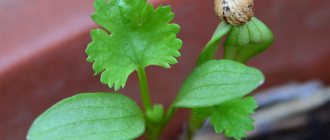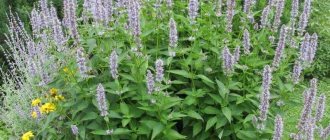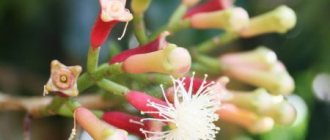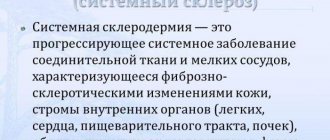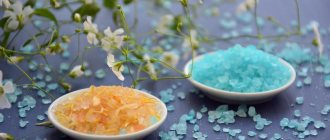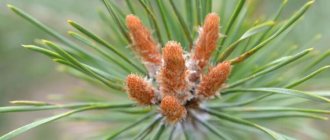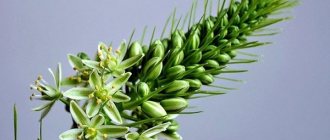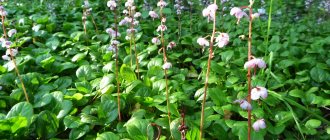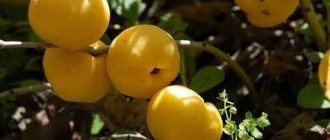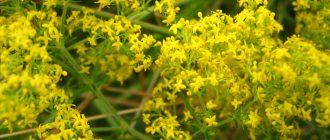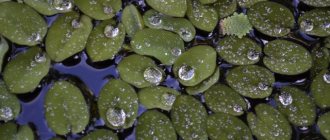Coriander (lat. Coriandrum sativum) is one of the most ancient spicy plants in the world. Another scientific name is Vegetable Coriander. It is popularly known as cilantro. Residents of India, China and Egypt have been eating it for thousands of years and using it to treat various diseases. The healing power of the plant is reported in the Old Testament and texts written in Sanskrit. The supposed homeland of Coriandrum sativum is the Mediterranean. Initially, he most likely grew up in Algeria, Sinai, Israel, Lebanon, Jordan, Bulgaria, Croatia, Slovenia. Now it is grown in South and North America, Europe, and Asia.
What does the plant look like?
Coriander sativum is a herbaceous annual, the height of which is 30-90 cm and depends on the place of growth and variety. Young leaves are round, wide, tripartite, while older leaves are twice pinnately divided. Flowering begins in June - July and lasts 4 weeks.
The flowers are small, pink or white. The fruits are almost round in shape, with vertical grooves. The seeds are yellow to brown, 2.5-5 mm in size.
Fresh greens are characterized by a strong aroma associated with high aldehyde content . To some it resembles the smell of musk, to others - lemon or soap. Unripe coriander seeds emit an unpleasant odor, very similar to that of a bug. As it matures it decreases.
Description of the plant
Coriander is an annual plant. The second name is cilantro. The fact is that the greens are called cilantro, but the seeds are directly coriander.
Gardeners sow its seeds every year to obtain this healthy greenery for use. Coriander leaves (the root part) are umbrellas of greenery.
There are several types of leaves:
- Basal leaves
- Lower
- Upper
The lower leaves dry out very quickly, and the beneficial properties remain only in the upper leaves.
Coriander flowers resemble an umbrella; flowering begins with the umbrella located in the center. Interestingly, all shoots do not bloom at the same time. Thus, the ripening of the fetus does not occur simultaneously. In addition, the fruits can crumble, and are even prone to this. The coriander flower is white, pink and cream in color.
They start collecting cilantro in advance. Since the fruit can fall off, it is collected in advance; as soon as the coriander is half ripe, it begins to be collected. Then the plant lies for 5 days, thus the plant ripens. In factory cultivation, the plant is processed using combines. The seeds are well dried and stored in airtight packaging.
Although the plant has an indefinite smell and its taste is widely used in cooking, for most it is a favorite type of spice. The plant has anti-inflammatory and medicinal properties. It is widely used in alternative medicine, as the plant replenishes the body with missing vitamins.
Composition and calorie content
The composition of the seeds varies depending on the degree of maturity. They contain essential coriander oil (Latin Oleum corandri aethereum), mainly consisting of terpenoids (linalool, camphor, γ-terpinene, α-pinene, etc.) and fatty oil (Latin Oleum coriandri), which in its properties resembles palm oil and coconut. Roots and greens also contain small amounts of essential oil.
The calorie content of seeds is 298 kcal, leaves - 23 kcal. Below is the content of vitamins, macro- and microelements in greens.
Macronutrients:
- water - 77.93 g;
- carbohydrates - 18.7 g;
- fats - 0.45 g;
- proteins - 1.1 g.
Vitamins:
- C - 27 mg;
- E - 2.5 mg;
- B1 - 67 mcg;
- B2 - 0.16 mg;
- B3 - 1.11 mg;
- B5 - 0.57 mg;
- B6 - 0.15 mg;
- folic acid - 62 mcg;
- A - 0.34 mg;
- K1 - 0.31 mg.
Minerals:
- potassium - 0.52 g;
- magnesium - 26 mg;
- zinc - 0.5 mg;
- iron - 1.77 mg;
- copper - 0.23 mg;
- calcium - 67 mg;
- selenium - 0.1 mcg;
- sodium - 46 mg;
- manganese - 0.43 mg;
- phosphorus - 48 mg.
Fatty acid:
- saturated - 14 mg;
- simple unsaturated - 0.28 g;
- polyunsaturated – 40 mg.
Plant composition
The composition of coriander is truly rich. Cilantro is full of vitamins.
- It contains vitamins such as: A, B1, B2, C. The plant also contains essential oil.
- Coriander combines Vitamin C and P, and it is their combination that helps strengthen capillaries.
But the chemical composition of cilantro seeds looks richer.
Coriander seeds contain up to 20% fatty oils, due to which it is rich in its beneficial properties.
- Oleic
- Linoleic
- Palmitic
- Stearic
In addition, the seed contains a lot of other useful components, vitamins and minerals:
- Calcium
- Iron
- Potassium
- Magnesium
- Selenium
Coriander - seasoning and garnish
Residents of Southeast Asia and Latin America have been eating cilantro since childhood. The feathery leaves are eaten as a side dish, finely chopped with a knife and added to sauces and fillings. Fresh herbs are the main component of the traditional Canarian Mojo sauce and the Chilean herbal sauce Pebre.
Russians put cilantro in salads. The Thais make a sauce from the root of the plant.
Ground dried seeds are found in dry gingerbread spice mix. They are added to marinades, sausages, baked goods, desserts, liquor, meat, fish and vegetable dishes. This is an important component of curry and the main seasoning in Georgian cuisine.
The famous Tkemali plum sauce is made with whole or ground seeds, depending on the variety. Coriander is often combined with cumin.
Tkemali sauce
The spice gives a piquant aroma to the German Gose beer, which is produced in the states of Saxony-Anhalt and Saxony. Whole coriander seeds are brewed as tea.
Mashed potatoes with cilantro
Cut pink potatoes (500 g) into 4 parts, boil in a double boiler for about 35 minutes. Finely chop coriander root (3 tablespoons) with a knife. Melt butter (50 g), add black cumin (2 tsp), vegetable broth (instant, 1 tsp), cream (100 ml). Crush the potatoes along with the prepared mixture.
Serve as a side dish for grilled sausages or sausages.
Coriander: beneficial properties
The ancient Greek physician Hippocrates from the island of Kos called coriander a natural medicine. The medicinal effect of the plant is associated with its high content of phytonutrients (or phytonutrients) and essential oils. They help detoxify the body and help with problems such as:
- gastrointestinal diseases;
- chronic inflammatory diseases (for example, rheumatism);
- infections.
Scientists are considering the plant extract as a possible natural alternative to antibiotics. They were able to extract 15 active substances from the leaves that are effective against various harmful microorganisms. The main role is played by linalool, dodecanol and dodecenal, which destroy even multi-resistant bacteria.
Bitter - spicy taste stimulates the production of gastric juice, bile, enzymes
The study found that dodecanol, found in greens and seeds, is twice as potent as the well-known antibiotic gentamicin. The chlorophyll and antioxidants present in greens strengthen the immune system and counteract inflammation.
European naturopaths use the spice to remove heavy metals from the body: mercury, lead, aluminum, cadmium. For detoxification after dental amalgam filling, it is recommended to use concentrated coriander extract in combination with chlorella and wild garlic so that the mercury is not only dissolved, but also released from the body.
Otherwise, it will circulate there, causing even more harm.
Leaf and seed extracts enhance antioxidant protection in patients with chronic inflammatory diseases, thereby promoting relief. Studies that have proven their beneficial properties have been conducted on humans and animals.
Tea for indigestion
Pour 250 ml of hot water 2 tbsp. l. crushed seeds or dried leaves. Leave for 10 minutes. Drink tea slowly, in small sips. The recommended dose is 1-3 cups per day. According to Dr. James A. Duke, just one cup of coriander tea provides relief from any mild gastrointestinal ailment.
Traditional medicine recipes from coriander
Coriander is used in alternative medicine recipes both for oral administration (decoctions, water infusions, coriander oil and alcohol tinctures) and for external treatment.
Actions of seeds
For indigestion
Coriander oil should be taken for intestinal atony, constipation, increased gas formation and flatulence. The oil can be made according to this recipe:
- for ½ cup of seeds take 0.9-1 liter of vegetable oil;
- steam the mixture in a steam bath for 60 minutes. and after cooling, filter;
- Keep refrigerated;
- drink 10-15 drops three times a day 20-30 minutes before eating.
To enhance the tone of intestinal smooth muscle fibers, it is necessary to use a decoction of dry coriander fruits:
- for 1 tsp. seeds should be taken 200 ml of water;
- boil for 10 minutes. and after cooling, filter the broth;
- take 50 ml three times a day.
For colds and flu
For chills and hyperthermic syndrome:
- it is necessary to make an infusion of 10 g of crushed seeds and 250 ml of boiling water;
- leave in a thermos for 7-8 hours;
- it must be prepared overnight in order to drink it in the morning.
Tea is also used for colds:
- 1 tbsp. l. chop fresh herbs and pour 200 ml of boiling water into a thermos;
- leave the mixture for 1 hour and filter;
- You can add lemon and organic honey to tea;
- drink twice or thrice a day.
The oil can be used for inhalation for productive and non-productive cough:
- 2-3 drops per two liters of hot water;
- the inhalation procedure lasts 3-5 minutes;
- the procedure can be performed twice a day.
Rich source of vitamins
For conjunctivitis
To eliminate infection in the mucous membranes of the eyes, it is necessary to wash them with cilantro infusion, which has an antibacterial effect and will help quickly get rid of conjunctivitis. You should wet the cotton pads and rinse your eyes with the infusion. The procedure is carried out several times a day. You can also chop cilantro and apply the paste on closed eyelids, this relieves inflammation from the eyes and eliminates infection. The crushed leaves must be mixed with a small amount of water.
For disorders of the nervous system and psyche
For neuroses and psychoses, as well as for overexcitation of the nervous system, it is necessary to use an alcohol tincture:
- for 50 g of seeds you need to take 450 ml of alcohol or vodka;
- leave for 10-15 days;
- take 1 tbsp. l. 3 times a day.
To eliminate increased irritability and excitability, you need to use coriander decoction:
- 1 tsp. powdered seeds + 250 ml boiling water;
- boil for 15 minutes in a steam bath and leave for 40-45 minutes;
- filter and add water to a volume of 250 ml;
- drink 2 tbsp. l. four times a day.
For headaches
To eliminate headaches and reduce the intensity of migraines, it is necessary to carry out inhalation procedures:
- 1 tsp. crushed coriander seeds per 400-500 ml of boiling water;
- the procedure lasts 5-7 minutes;
- Afterwards, the infusion should be filtered and used as tea, adding 1-2 tsp. organic honey or lemon slice;
- drink 150-200 ml twice a day.
For inflammation of the gallbladder
For cholecystitis and disorders of the gallbladder, it is necessary to use the following herbal collection:
- 3 g each of watch leaves and caraway inflorescences;
- 1 g coriander seeds;
- 500 ml water.
1 tbsp. l. pour the crushed collection with water and simmer for 7-8 minutes over low heat. Leave for 30 minutes. and filter. Drink 60 ml three times a day.
For women
Herbalists recommend using coriander infusions for women during menopause. Infusions relieve overexcitation of the nervous system, reduce the frequency and intensity of hot flashes:
- for infusion you need to take 1 tsp. seeds and pour 200 ml of boiling water;
- leave for 30 minutes;
- after filtration, take 70 ml three times a day.
Menopause symptoms
To normalize the menstrual cycle, you need to prepare a decoction:
- take 1 tsp. coriander seeds per 250 liters of water;
- evaporate the mixture over very low heat until the volume of liquid is reduced by half;
- drink 30 ml 3 times a day 5 days before the start of menstruation.
For men's health
Men need to take the spice to increase potency. The plant contains the phytohormone androsterone, which is a natural analogue of testosterone. Cilantro salad is a natural aphrodisiac, so it should be eaten before intimacy.
Cilantro and its seeds increase the concentration of active sperm in the seminal fluid, which increases the chances of conception. Systematic consumption of coriander in seeds or greens increases the performance of the reproductive organs, and also reduces inflammation in the male genitourinary system.
The use of coriander infusion or alcohol tincture reduces the risk of developing prostatitis and prostate adenoma, and also lowers the cholesterol index in the blood, which is the prevention of systemic atherosclerosis, disorders of the circulatory system and myocardium. If you chew the seeds, it kills the smell of alcohol, relieves alcohol intoxication and intoxication.
For weight loss
To reduce excess body weight, add cilantro greens and seeds to your diet. This not only allows you to diversify the menu during the diet, but also accelerates all metabolic processes in the body and normalizes lipid metabolism. If you adjust your diet and add more fresh vegetables, herbs and protein products to the menu, then you can lose 5 kg of excess weight in a month.
To improve the taste of the dish, coriander can be mixed with cardamom, black and allspice, cumin and cumin. Cilantro roots can be added to stews, first and second courses, and the grains can simply be chewed in the mouth.
You should not get carried away with coriander and consume it above the norm, this can lead to a reverse reaction in the body, because the plant increases appetite.
In cosmetology
Cosmetologists use the spice to relieve puffiness, treat acne, inflammation on the face, as well as eliminate age-related pigmentation and rejuvenate the epidermis. Can be used in masks, scrubs and lotions. The spice helps fight dandruff and hair brittleness.
Infusions and decoctions are used to strengthen hair follicles and restore hair structure. To rinse hair after washing:
- you need to mix 1 tbsp. l. coriander and mint and pour a liter of boiling water;
- leave for 30 minutes.
Whitening and rejuvenating mask:
- mix yogurt in a blender with cilantro (proportion 2:1);
- add a few drops of lemon juice;
- apply on face for 30 minutes;
- rinse with warm running water.
See also:
Schisandra chinensis - medicinal properties, contraindications, benefits and harms
